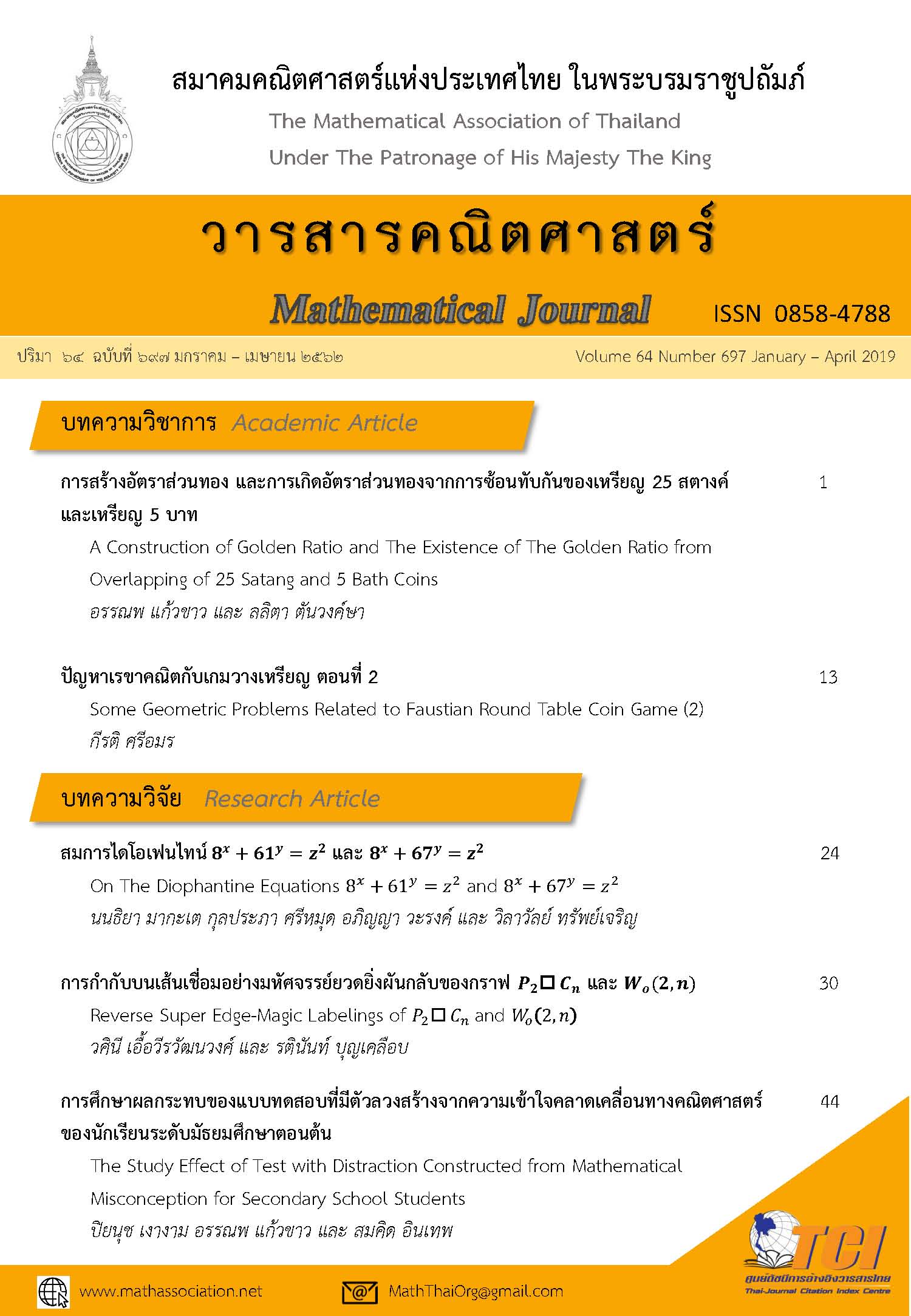The Study Effect of Test with Distraction Constructed from Mathematical Misconception for Secondary School Students
Main Article Content
Abstract
The main purposes of this research were to study the effects on secondary school students from test with distraction constructed. The sample of this study was a group of 274 students at Sikhoraphumpisai School, in the first semester of academic year 2018. The results revealed that (1) objective test scores for who took the normal test were significantly higher than that for who took the distraction test at the 0.05 level. (2) subjective test scores for who took the normal test were significantly higher than that for who took the distraction test at the 0.05 level.
Article Details
How to Cite
Ngao-Ngam, P., Kaewkhao, A., & Intep, S. (2019). The Study Effect of Test with Distraction Constructed from Mathematical Misconception for Secondary School Students. Mathematical Journal by The Mathematical Association of Thailand Under The Patronage of His Majesty The King, 64(697), 44–60. retrieved from https://ph02.tci-thaijo.org/index.php/MJMATh/article/view/180311
Section
Research Article
References
[1] ชานนท์ จันทรา. (2553). ขั้นตอนวิธีการพิสูจน์ทางคณิตศาสตร์สำหรับครู, กทม: บริษัท อาร์
แอนด์เอ็น ปริ้นท์ จำกัด.
.Juntra, Ch. (2010). Algorithms in mathematics proofs for teachers, Bangkok:
R&N Print Company Limited.
[2] ศรีวิชัย กาญจนาวสี. (2556). ทฤษฎีการทดสอบแบบดั้งเดิม, กทม: โรงพิมพ์แห่งจุฬาลงกรณ์
มหาวิทยาลัย
Kanchanawasee, S. (2013). Classical Test theory, Bangkok: Chulalongkorn
University Printing house.
[3] รณิดา เชยชุม. (2552). “การเปรียบเทียบคุณภาพของข้อสอบและแบบสอบหลาย
ตัวเลือกที่มีรูปแบบตัวเลือกต่างกัน”, ปริญญาครุศาสตร์ดุษฎีบัณฑิต,สาขาการวัดและประเมินผล
การศึกษา, คณะครุศาสตร์, จุฬาลงกรณ์มหาวิทยาลัย.
Chaechum, R. (2009). The comparison of qualities of multiple-choice items and
tests with different types of choice, Degree of Doctor of philosophy, program in
Educational Measurement and Evaluation, Faculty of Education, Chulalongkorn
University.
[4] สมนึก ภัททิยธนี. (2553). การวัดผลการศึกษา, มหาสารคาม: ภาควิชาวิจัยและพัฒนาการศึกษา
คณะศึกษาศาสตร์ มหาวิทยาลัยมหาสารคาม.
Phattiyathani, S. (2010). Educational Measurement, Mahasarakham: Department
of Educational Research and Development Faculty of Education Mahasarakham
University.
[5] สมชาย วรกิจเกษมสกุลม. (2554). ระเบียบวิธีการวิจัยทางพฤติกรรมศาสตร์และสังคมศาสตร์,
อุดรธานี: อักษรศิลป์การพิมพ์.
Worakitkasemsakun, S. (2011). Research methodology in behavioral sciences and
social sciences, Udon Thani: Aksorn Sil Printing.
[6] ไพศาล วรคํา. (2019). การวิจัยทางการศึกษา, มหาสารคาม: ตักสิลาการพิมพ์.
Worakham, P. (2019). Educational Research, Mahasarakham: TugaSila
Printing.
[7] ทิศนา แขมมณี. (2558). ศาสตร์การสอน, กทม: สำนักพิมพ์แห่งจุฬาลงกรณ์มหาวิทยาลัย.
Khaemmanee, T. (2013) Science of Teaching , Bangkok: Chulalongkorn
University printing house.
แอนด์เอ็น ปริ้นท์ จำกัด.
.Juntra, Ch. (2010). Algorithms in mathematics proofs for teachers, Bangkok:
R&N Print Company Limited.
[2] ศรีวิชัย กาญจนาวสี. (2556). ทฤษฎีการทดสอบแบบดั้งเดิม, กทม: โรงพิมพ์แห่งจุฬาลงกรณ์
มหาวิทยาลัย
Kanchanawasee, S. (2013). Classical Test theory, Bangkok: Chulalongkorn
University Printing house.
[3] รณิดา เชยชุม. (2552). “การเปรียบเทียบคุณภาพของข้อสอบและแบบสอบหลาย
ตัวเลือกที่มีรูปแบบตัวเลือกต่างกัน”, ปริญญาครุศาสตร์ดุษฎีบัณฑิต,สาขาการวัดและประเมินผล
การศึกษา, คณะครุศาสตร์, จุฬาลงกรณ์มหาวิทยาลัย.
Chaechum, R. (2009). The comparison of qualities of multiple-choice items and
tests with different types of choice, Degree of Doctor of philosophy, program in
Educational Measurement and Evaluation, Faculty of Education, Chulalongkorn
University.
[4] สมนึก ภัททิยธนี. (2553). การวัดผลการศึกษา, มหาสารคาม: ภาควิชาวิจัยและพัฒนาการศึกษา
คณะศึกษาศาสตร์ มหาวิทยาลัยมหาสารคาม.
Phattiyathani, S. (2010). Educational Measurement, Mahasarakham: Department
of Educational Research and Development Faculty of Education Mahasarakham
University.
[5] สมชาย วรกิจเกษมสกุลม. (2554). ระเบียบวิธีการวิจัยทางพฤติกรรมศาสตร์และสังคมศาสตร์,
อุดรธานี: อักษรศิลป์การพิมพ์.
Worakitkasemsakun, S. (2011). Research methodology in behavioral sciences and
social sciences, Udon Thani: Aksorn Sil Printing.
[6] ไพศาล วรคํา. (2019). การวิจัยทางการศึกษา, มหาสารคาม: ตักสิลาการพิมพ์.
Worakham, P. (2019). Educational Research, Mahasarakham: TugaSila
Printing.
[7] ทิศนา แขมมณี. (2558). ศาสตร์การสอน, กทม: สำนักพิมพ์แห่งจุฬาลงกรณ์มหาวิทยาลัย.
Khaemmanee, T. (2013) Science of Teaching , Bangkok: Chulalongkorn
University printing house.


